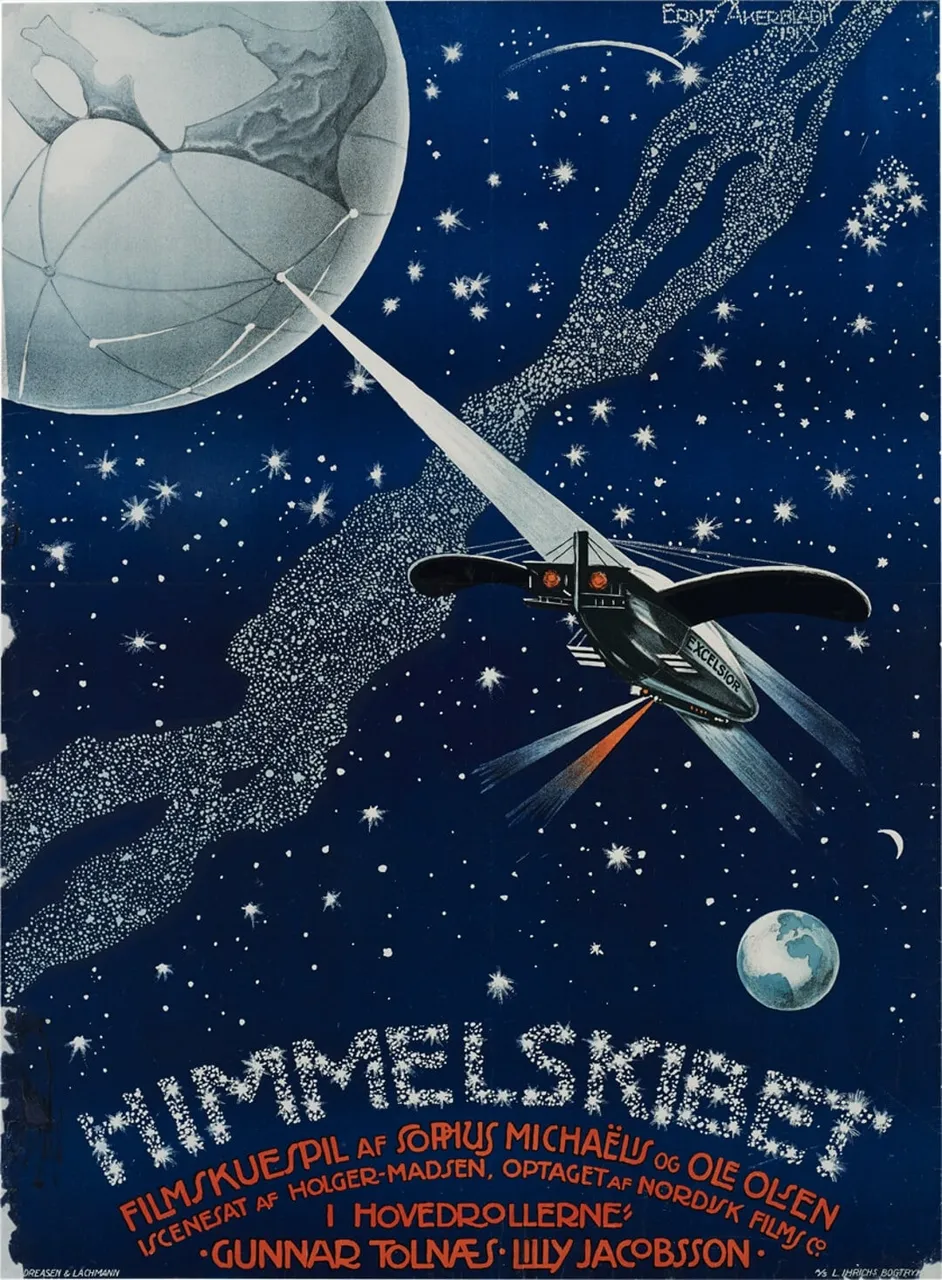
Denmark, despite relative small size, made large contributions to the world cinema. Much of that should be credited to Nordisk Film, one of the oldest an most respected film studios of Europe. Its golden age corresponded to First World War, when neutral Denmark had relatively little problems reach markets of countries at war. One of the most interesting titles of the period was Himmelskibet (or “Heaven Ship”, in English-speaking countries known as A Trip to Mars), 1918 silent film directed by Holger-Madsen, known as one of the earliest science fiction feature films and the first to depict interplanetary voyage.
Protagonist of the film is Captain Avanti Planetaros (played by Gunnar Tolnæs), famed explorer who, after the last triumphant expedition, wants to explore something new. His father Professor Planetaros (played by Nicolai Neilendam) talks him into exploring space. Avanti brings Dr. Krafft (played by Alf Blütecher), fiance of his sister Corona (played by Zanny Petersen), to build space ship called “Excelsior”. Two years later ship is finished and, manned by Avanti, Krafft and international crew, begins its long journey to Mars. The expedition faces biggest obstacle in the long tedium of space travel and after six months some of the crew members are at the edge of mutiny. Just as everything seems lost, “Excelsior” is pulled towards Mars by a tractor beam operated from Mars. When Avanti and his crew land, they are greeted by representatives of human-like telepathic race of pacifist vegetarians, whose leader (played by Philip Bech) explained that Martians observed Earth for thousands of years. After some initial and nearly fatal misunderstandings, Avanti learns how Martians used to be warlike and violent like people of Earth before adopting their peaceful ways. He falls in love with leader’s daughter Marya (played by Lilly Jacobsen) and returns to Earth trying to spread Martian message of peace among his people.
Made only fifteen years after A Trip to the Moon, short film by George Melies which had the similar subject, Himmelskibet shows how technology and film making craft rapidly advanced even in silent era. Cinematography by Fredrik Fuglsang and Louis Larsen looks very good, there are plenty of mass scenes featuring large number of extras, and, while the design of the space ship looks ridiculous for audience with knowledge of physics or accustomed to images of actual space flight, submarine-like interior of Excelsior looks unusually realistic. Production design of Mars and Martian costumes look imaginative and create otherwordly feel not that different than alien settings in Star Trek half a century later. Even some special effects look good for standards of its era, like in the scene when Marya uses large television-like device to familiarise Earthlings with Martian past.
Himmelskibet doesn’t show its age with technical details, but it is quite different with storytelling and other details there were characteristic for silent cinema, The most obvious is over-theatrical acting, which is especially annoying in case of main star Gunnar Tolnæs whose character uses every opportunity to point at things. Tolnæs, Norwegian actor who was big star of Danish films, voluntarily ended his career only a decade later, wisely concluding that his style of acting would be out of place in the world of sound cinema. The rest of the cast, which doesn’t stand out that much, is more tolerable. That includes Nils Asther, who appears in the small role of wounded Martian, and who would later become big Hollywood star.
Another problem for Himmelskibet is in the script by Sophus Micahelis and Ole Olsen, which deprives the story for much of the dramatic conflict. Apart from boredom-inducing attempted mutiny at the ship and potentially fatal misunderstanding on Mars, there isn’t any conflict among characters. There aren’t any villains, with exception of Professor Dubius (played by Frderik Jacobsen), scientist sceptical of expedition’s success, who constantly mocks his colleague Planetaros in increasingly annoying and cruel way only to be punished for it near the end in the most melodramatic way possible. And the utopian society of Mars, unlike so many alien utopias shown in Star Trek, is exactly what it claims to be, without any hidden dark secrets.
This problem, however, stems from film’s message. Holger-Madesn, like many film makers in Denmark and other neutral countries (including USA before its entry to war), was aghast with carnage with was going on in Europe at the time. Himmelskibet was his attempt to tell everyone that was better way for humanity to exist, a concept based on love, peace, understanding and international cooperation. Some might argue that the story about alien civilisation that looks like combination of ancient Greeks and hippies wasn’t the most effective way to do it, but in our dark times films like this one are actually more needed that they were more than a century ago.
RATING: 7/10 (+++)
Blog in Croatian https://draxblog.com
Blog in English https://draxreview.wordpress.com/
Leofinance blog @drax.leo
Unstoppable Domains: https://unstoppabledomains.com/?ref=3fc23fc42c1b417
Hiveonboard: https://hiveonboard.com?ref=drax
Bitcoin Lightning HIVE donations: https://v4v.app/v1/lnurlp/qrcode/drax
Rising Star game: https://www.risingstargame.com?referrer=drax
1Inch: https://1inch.exchange/#/r/0x83823d8CCB74F828148258BB4457642124b1328e
BTC donations: 1EWxiMiP6iiG9rger3NuUSd6HByaxQWafG
ETH donations: 0xB305F144323b99e6f8b1d66f5D7DE78B498C32A7


